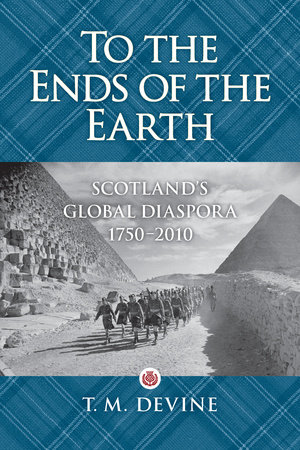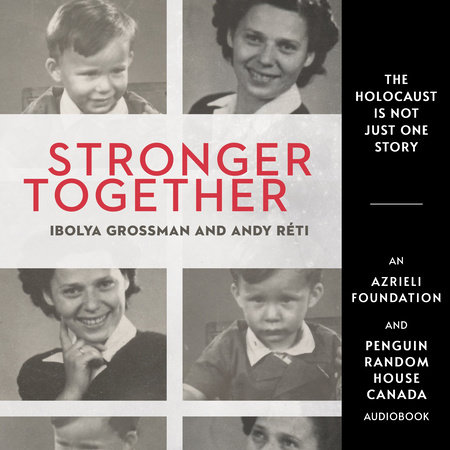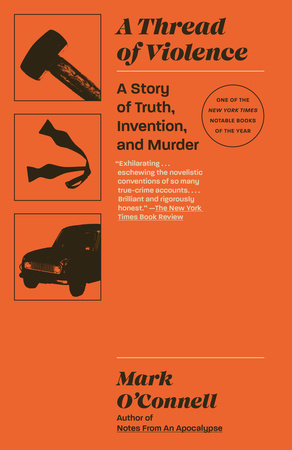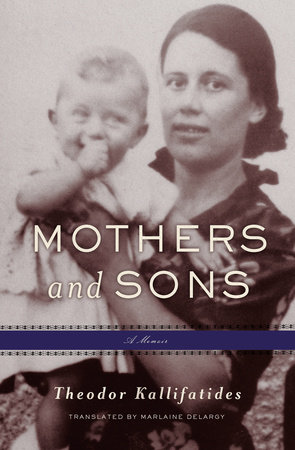


-
Oct 25, 2011 | ISBN 9781588343185
YOU MAY ALSO LIKE

Naples 1343

Stronger Together

Too Great a Sky

Spare

Time’s Echo

Village Voices

A Thread of Violence

The Northwomen

Never Far Apart
Praise
Praise for T. M. Devine’s The Scottish Nation, 1700-2007:
“One of the most significant Scottish books of the century.” –The Herald
PUBLISHERS WEEKLY
In this follow-up to The Scottish Nation: 1700–2007, University of Edinburgh history professor Devine casts his net more widely to describe Scottish emigration throughout the world. A poor land in the 18th century, Scotland lagged behind England’s Industrial Revolution. By 1850 it had caught up, but Scots continued to leave in record numbers. They made an early, bad impression in revolutionary America because most were loyalists, but this was soon replaced by the ongoing stereotype of the thrifty, superachieving Scotsman. There was no shortage of failure and bad behavior, but Devine admits that, wherever they settled, Scots were overrepresented among business, education, military leadership, and missionary work. He explores the source of that success in chapters on Scottish demographics, religion, and economics, devoting as much space to his nation’s culture as its emigrants. Although not an academic study, the book contains more statistics, tables, and critical arguments than the average history buff would want, but readers willing to skim will enjoy an enlightening experience. 10 maps. (Oct.)
LIBRARY JOURNAL
Devine (Sir William Fraser Professor of Scottish History & Palaeography, Univ. of Edinburgh; The Scottish Nation, 1700 2007) rounds out his trilogy of authoritative works on Scottish history with this seminal volume on the dispersion of the Scots to other lands throughout history. Devine insightfully addresses the impetus behind the large-scale Scottish emigration as well as the experiences of émigrés in their new lands over the past 250 years. Covering Scottish engagement in the colonial slave and tobacco trades; the movement of impoverished Highland Scots during famine in the 1850s; fortune-seeking Scots in the British Empire and the American colonies; and Scottish missionary efforts in India and Africa, Devine offers a sweeping critical examination of this topic, which he admits is in its infancy as an area of academic study. He succeeds in addressing a broad span of time and geography while avoiding both triumphalism and exceptionalism on behalf of the Scots. VERDICT A meticulously researched and thoroughly documented academic volume that will be welcomed by scholars and others with a keen interest in Scottish history.—Elizabeth L. Winter, Georgia Inst. of Technology Lib., Atlanta
CHOICE
Devine (Univ. of Edinburgh, Scotland) concludes his masterful trilogy of Scottish history, following his critically acclaimed The Scottish Nation, 1700-2000 (1999) and Scotland’s Empire, 1600-1815 (CH, Apr’05, 42-4853) with this volume that tells the tale of the thousands of Scots who migrated throughout the British Empire. Devine delves behind the myths and notions of nationalistic pride while examining the distinctive contribution of Scots to the development of the British Empire from North America to the smallest Caribbean islands. The author pays particular attention to the role of Scottish traders, missionaries, and soldiers who were greatly overrepresented as a percentage of the population throughout the British Empire. Equally of interest is Devine’s examination of the impact of the Scottish diaspora and newly globalizing economy of Scotland itself, deftly illustrating the two-way nature of the linkages and import of the overseas Scots to the development of Scotland. The author’s broad grasp and meticulous research of the topic has produced another first-rate book that cements his reputation as the preeminent historian in the field of modern Scottish history. Summing Up: Highly recommended. Most levels/libraries. – S. M. McDonald, Bentley University
THE ECONOMIST
Two years ago more than 47,000 people from all over the world journeyed to Scotland to celebrate their Caledonian lineage in an event called the “Homecoming”. Many of them had only recently discovered an interest in their origins and some, it seems safe to say, held peculiar ideas about where their forebears had come from and what impelled them to leave. Many people of Scottish descent, especially in America, assume that their ancestors hailed from the Highlands; that having been dispossessed of their land, they were forcibly driven into exile; and that after the Jacobites’ defeat at the battle of Culloden in 1746, if not before, these brave, egalitarian and freedom-loving people were victims of the oppressive English.
The truth is more complicated than that, as T.M. Devine, a professor of history at the University of Edinburgh, is at pains to show. The Scots have been emigrants and adventurers since at least the 13th century. At first most went to northern Europe as mercenary soldiers or traders, setting up commercial networks from Rotterdam to Königsberg and penetrating far into Poland. Later they settled in large numbers in Ulster. By the beginning of the 18th century life expectancy was rising among landed Scots but second and third sons had little hope of becoming farmers.
For many of these, the Act of Union with England in 1707 came as a blessing. It opened to Scottish merchants the protected markets of the English colonies and provided countless jobs for soldiers, contractors and bureaucrats in an expanding empire. For Presbyterians, the union also had the political advantage of providing a defence against the possibility of an unwelcome Catholic Stuart restoration.
Scots, already well established in the Caribbean, were soon all over British North America and, through the East India Company, much of Asia. Scots were prominent in trading firms like Jardine Matheson and the North West Company; in 1799, 78% of the overseas employees of the Hudson’s Bay Company, whose domain encompassed more than 10% of the Earth’s land surface, came from the islands of Orkney alone. Scottish emigrants flourished not only throughout the empire but also in England, other parts of Europe, and even South America and Japan.
Many of those who stayed at home also prospered. By the 1770s Glasgow had secured most of the British tobacco trade. It later became a centre for sugar, engineering and shipbuilding. All over the country fortunes were being made in textiles or related products. In Dundee the product was jute, in Paisley it was thread, in Kirkcaldy carpets. Scotland also became a leader in railways, chemicals, locomotives and then finance. No wonder that by the 1850s it was one of the most urbanised and industrialised countries in the world.
Why then did it send so many of its citizens abroad? The answer varies according to time and place of origin. Emigrants came from all over the country. Some, particularly in the Highlands and islands, were certainly poor, even destitute, and the clearances in the late 1840s and early 1850s were undeniably brutal and often coercive. Most of those who left, however, were not utterly impoverished; many had skills and qualifications. Some were driven by martial spirit, missionary zeal or imperial fervour. The empire, Mr Devine points out, was an emphatically British venture in which the Scots saw themselves as equal partners with the English, giving them self-respect as well as prosperity.
The main motive, though, was the desire for a better life and more opportunities. In this, and in their readiness to work hard, Scots were much like emigrants elsewhere. Similarly, like other emigrants, they persecuted native Americans, exterminated aborigines, stole land, defrauded their partners, exploited their workers and happily traded in opium. They did not trade in slaves, not much anyway. But Scotland’s economy in the 18th century was inextricably intertwined with slavery through the sugar, tobacco and cotton industries, plus the civil and military structures that sustained them. Scots were pretty average in other ways, too. They made bad investments, could be thoroughly prejudiced (often about each other) and, it should be remembered, frequently returned home as failures (over 40% in the 1890s).
Yet in some ways they were untypical. They were often educated, which helped to account for the high numbers of lawyers, doctors and engineers among them. This in turn may explain why they were so influential in the lands where they settled. They were also militaristic, religious (David Livingstone, still revered in Africa, became a Victorian saint), loyal (notably to the Crown in the American colonies) and liberal (reflecting the Scottish Enlightenment). Above all, they were numerous, at times proportionately more so than any European nation except the Irish and perhaps the Norwegians.
Mr Devine explains all this with a masterly breadth of knowledge and an admirable absence of hyperbole. Unfortunately, his editors do not match his skills. The inclusion of so much analysis of Scottish topics and Scotland’s engagement with the world shortchanges those expecting a comprehensive book about the emigrants themselves. Moreover, the reader may weary of so many repetitive statistics. Most could have been incorporated in a single chart or map showing how many Scots left when, where they came from and where they went. All these blemishes, however, count as little compared with the work’s great virtue of helping to rescue Scottish history from the romanticised, self-pitying, tartan tosh that has captured the popular imagination of so many Scots both at home and abroad.
21 Books You’ve Been Meaning to Read
Just for joining you’ll get personalized recommendations on your dashboard daily and features only for members.
Find Out More Join Now Sign In









